A few days ago, I was voluntold I was needed to help run a swim meet. A meet that was supposed to be my daughter’s first ever swim meet at seven years old. I wanted to support her, be at her side, and then watch her compete—not busy working the ribbons table or timing the swimmers or doing whatever other tasks are necessary. Despite my offer to text this person and let her know later if I would be available, she was insistent.
“We may have to cancel the meet if more people don’t step up,” she said.
Honestly, it pissed me off.
And then I remembered I’d felt this way before. Last month, parents at my daughter’s school were told that without enough volunteers, a school field trip would be canceled.
And that made me recall when there weren’t enough coaches for the soccer league, and parents were informed that if no one stepped up, the team would be dissolved, the families would get refunds.
I’m writing the word “parents” but so often, the burden of volunteering falls on moms. It’s the moms going on the field trips. It’s the moms coaching the teams and running the events and baking the brownies and making sure field day is staffed. It’s the moms organizing everything. And if you’re a military spouse like me, you are likely well aware of the FRG (family readiness group), which is “command-sponsored programs to help build strong Families and bridge the gap between Families and units.” In my experience, this means wives taking on a multitude of tasks to help support an army unit. I’ve spoken with several women who feel like the FRG for their husband’s unit has expected them to effectively work a part-time job organizing events, welcoming new soldiers, cooking, etc.
Friends—this is all unpaid work that we as moms are expected to do. I would dare say guilt-tripped into doing.
I have so many thoughts and feelings about this.
We’ll start with the obvious—how ridiculous it is that our children’s public schools must rely on unpaid labor for field trips and reading groups and tutoring. What really pisses me off is how this unfairly affects low-income areas. Not everyone can afford to take a day off work to escort a group of kids to the zoo or the library or the beach. Not all teachers have a grandparent who can come in to tutor math for who kids who need extra help, or a parent who works part-time who can volunteer in the classroom. Which means these kids simply aren’t getting these opportunities.
It’s sexist that moms are expected to give up what little free time they have or take leave from work so they can do these things. It’s sexist that it is assumed moms have time for this. It’s sexist to assume moms want to do this. Yep, I said that. I love my kid. I love her friends. But in general? I don’t love doing this stuff. Chaperoning a bunch of kids who aren’t mine, and who I don’t know, and who are sometimes kind of assholes? No thanks.
But even if you’re as fired up as I am about this issue, you might have a hard time saying no to these asks. I was absolutely not promising to show up for half my Saturday, but still, as this woman pressured me, I felt guilty. I didn’t want to be the reason the meet didn’t happen, did I?
The whole situation was so uncomfortable.
Why couldn’t I just say no?
Why couldn’t I set that boundary?
Reframing boundaries—and saying no—is a feminist act.
Why is it hard to say no?
We were brought up in a society that encourages women to be self-sacrificing and agreeable. It’s seen as positive to have these attributes as a woman. Why else would we be told to smile all the damn time?
I have a hard time saying no sometimes because I don’t want someone to dislike me. Or to think I’m not a team player. Or to think less of me overall. Or for their judgment of me to affect how they treat my daughter.
But I also know that my husband would say no to most of these asks, without second-guessing himself, because of work. I work, too, of course, but my schedule is seen as “flexible.” Seventy-eight percent of moms identify as the default parent, and 73% of them feel as though they are the only ones managing the family’s calendar. The mental load of that is huge—especially on top of a part-time or full-time job—and we are then supposed to also volunteer what precious free time we have?
This article in Psychology Today illustrates why it’s so hard to say no: “… society teaches us the word ‘no’ is impolite and inconsiderate. We feel more obligated to go along with things we honestly do not want to do in order to be socially accepted.” We are humans, and humans are a social species, historically interdependent upon one another for survival. It’s important to fit in, to be viewed positively—and saying no puts us at risk to be seen as, well, not cooperative.
The Merriam-Webster definition of volunteering is “a person who voluntarily undertakes or expresses a willingness to undertake a service.” The keywords here include voluntary and expresses a willingness—a far cry from what I think many moms being pressured into these roles experience.
Now if you want to go on that field trip—great! You’re the person who should be going. But if you, like me, dread the idea of sitting on a bus with 80 six- and seven-year-olds, you should be allowed to simply say, “No, thank you,” and go about your business without feeling guilty.
Motherhood makes this even harder
I won’t lie—I think being a mom makes it harder to say no. Because, as I mentioned above, it’s not just about you. It’s about your kid. What if I say no to volunteering for this swim meet? Will it impact how my daughter is treated at practice? Will it influence whether she is allowed on the team next year? If I don’t sign up for the field trip, will it prevent her from getting to go to the zoo or the museum or the farm? We always have someone beyond ourselves to consider.
So what can we do?
Sharmin Banu is an executive coach, who says that boundary issues often arise when we’ve overcommitted—something true of just about every mom I know. We feel maxed out, but like we should be doing more, regardless. That more is better. Maybe your kids play multiple sports, or you have three kids and each has just one sport—but that’s still practice four nights a week, and don’t forget games on Saturdays. Maybe they play violin or take piano. Perhaps they need extra help and have a math tutor one night a week. And don’t forget to hit up the grocery store and make a healthy meal in between work and your kids’ activities. We’re expected to work like we don’t have kids and parent like we don’t have jobs. And then—volunteer, too?
We’re expected to work like we don’t have kids and parent like we don’t have jobs.
Sharmin talks about a multi-step approach: recognizing the need for change, identifying power dynamics, and knowing where to start—potentially by trying out saying “no” in relationships with lower stakes, such as someone we know is forgiving like our own mother or sister or best friend. She also discusses preparing in advance and practicing empathy—her article is well worth a read for more details.
I also really like the idea of considering what you’re saying yes to by saying no to something else. For example, I said no to volunteering at the swim meet (which by the way, my daughter decided she did not want to do). By doing so, I freed my family up to go camping—which honestly sounds way more fun than standing poolside staring at a timer for hours on end. Not to mention, a much better family bonding experience. And by saying no to chaperoning a field trip, I said yes to a meeting with my agent and spending a solid four hours on revisions—meaning I got my work done and was able to spend time with my family that weekend. I prioritized myself, but in reality, I prioritized my family, too.
One last tip I’ll offer is not to feel as though you have to say yes or no immediately—that sometimes, giving yourself time to think allows you the space you need to give an answer that’s better for you. Or, to send a text, which can feel easier than saying “no” in person . For example, at the swimming pool, I initially said, “I’ll need to check my calendar before I can commit to helping with the swim meet.” That gives me time and space to think. When we’re asked to do something, our minds can enter crisis mode—but there’s no reason for a right now! response. And if you feel pressured (as I was), you can add on, “I don’t want to make a promise to you I’ll have to break.”
Bonus tip (this is one of my best kept mom secrets!): I don’t keep a calendar on my phone. EVER. It’s at home. On my desk. And yes, this is wildly inconvenient at times, but I don’t care, because it means I never can commit to anything in the moment. It allows me to think through a situation, decide if I want to do it, and also, actually check to see if I’m even available. “I don’t have my calendar with me, I’ll text you,” are powerful words—use them!

Be that mom
Say no. Take up space. And in doing so, show your daughter she, too, can say no. Show your son. Show your friend and your sister that it’s okay to prioritize yourself and quite frankly, to disappoint others.
One thing I love about the relationship I have with my friend Amanda is that we both have given one another permission to simply say no. To opt out. To take a rain check. Or as I sometimes do, simply say, “Yeah, I don’t want to do that.” I never feel pressured to get together with her, and when we do have plans, I know that if I need to cancel, she won’t take it personally. We as women, wives, moms, need more relationships like this—where we give and accept people where they are at and don’t judge. We both take up the space we need, and we both respect that about each other.
I’ll bet the woman pressuring me was disappointed I wouldn’t help—but I’ll also bet that passed quickly and she found someone else. Meanwhile, I’m not locked into a half-day Saturday commitment for an event my kid doesn’t even want to do. I’d say in the end, we’re both okay.
What’s one place in your life where you want to say no more often?
My Personal Hit List
My copyedits are off to my editor! Whew. Copyedits are high pressure because it’s the last time you can substantially change anything. That meant I read through it slowly, sometimes aloud, making sure I was happy with phrasing, word choice, etc. I found that my characters blink too often, so I also did a quick pass changing that wording.
The other part that’s difficult is the dedication and acknowledgements being due. It was easy to know who to dedicate my first book to, and even my second—but my fifth?? And this book is so different in so many ways. I was tempted to dedicate it to my mom and daughter (as I did Make Me Disappear), but in the end, I chose a different path—you’ll get to see when the book comes out!
The same day I sent it off, I got edits back on Somebody Worth Killing book #2 (untitled so far), so I’ll start those on Monday!
Book Rec
If you’ve been around here long, you’ve seen me link to
’s Substack, Motherhood Until Yesterday. Well, it’s today’s rec. This is what she says about her own writing:I am a science writer and content creator focused on maternal wellness and mental health… my work is rooted in the concept of evolutionary mismatch—a theory that examines how contemporary lifestyles diverge from those our ancestors evolved to thrive in. I apply this lens to maternal mental health, exploring how the child-rearing practices and social structure of hunter-gatherer societies contrast with the expert-driven and isolated nature of modern motherhood.
Elena talks about a range of topics, from breastfeeding to how childcare affects your kiddo (good and bad), to why your kids (and therefore you!) are sick so often. I find it utterly fascinating, and hope you do, too. Here’s a great article to start with.
Pet Corner
If you follow me on Instagram, you know—we adopted a kitten last week! Last October, we lost Lilst Kitty, a sweet a girl who hopped into my car when I was 27 and refused to get out until I agreed to adopt her (true story). She was my kitty who followed me around, perched on my desk, sat on any and all papers I was trying to work on, and in general, was my writing cat. Losing her was really hard. We’d been thinking about getting another cat—being in the military means moving our pets with us, which makes life a little more complicated, and we already have two other kitties. But Emma was really wanting the whole kitten experience, and honestly, my office was feeling pretty empty.
And then we learned about Pearl, the last kitten from a litter that was born in a parking lot. Even her mom had been adopted already, and she remained alone at her foster family’s. I took Emma to meet her, and of course, we brought her home the same day. Enjoy the kitten cuteness—I sure am:
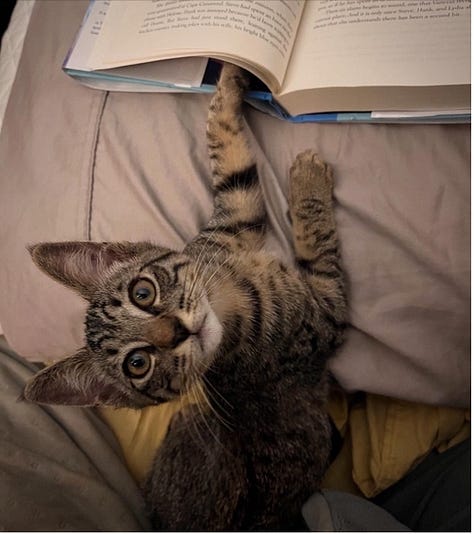
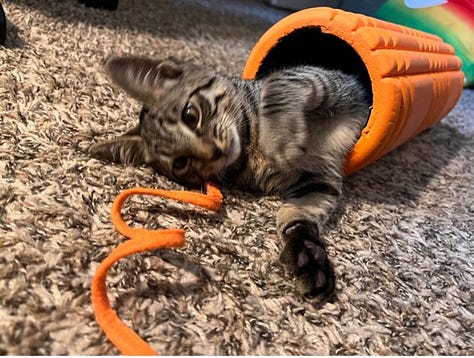
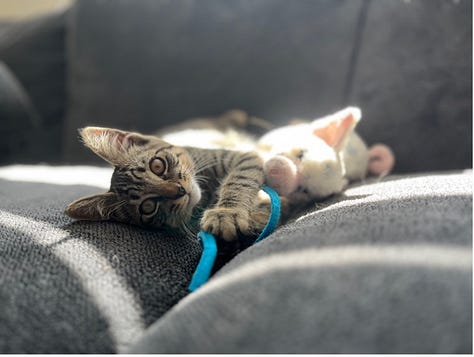
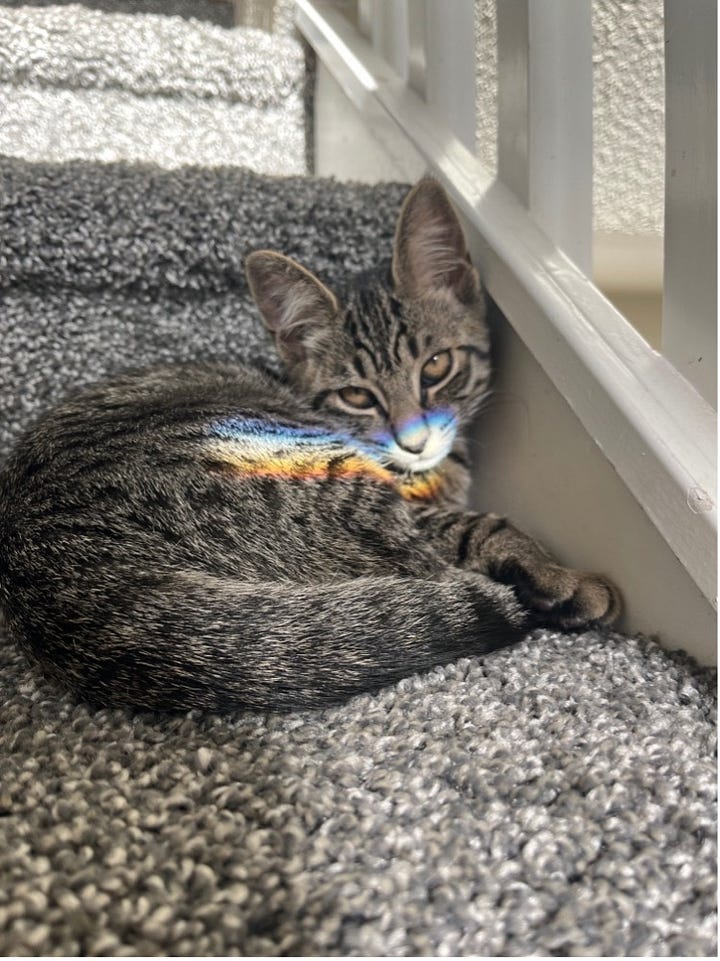
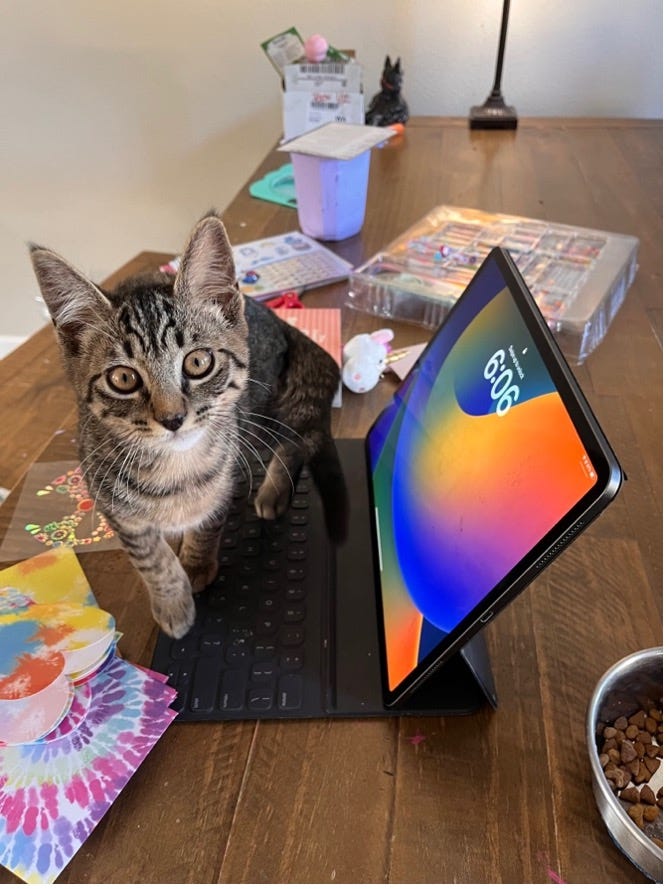
I will see you next week with another post!
In the comments, I’d love to know all about your pets or a place in your life in which you’d like to say no more often?






For three years I ran a nonprofit feminist writing conference entirely fueled by volunteer labor. As the executive director, I received a $12,500 stipend (for the year) and worked multiple freelance gigs. I think the more time that passes, the more grateful I am for all the time women gave to make it possible. My assistant (we paid her hourly) was a mom of twins who helped me at 5am with emails while her kids were asleep. My volunteer staff made lasting connections and it was a really beautiful conference. Unfortunately it just wasn’t financially sustainable (of the many problems I could enumerate, one is that there weren’t grants for administrative overhead).
You are a rebel Jessica Payne. I would drown without my electronic calendar, but it's a total boss move.